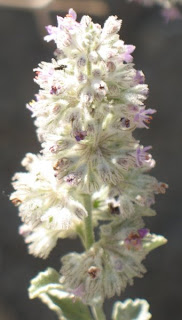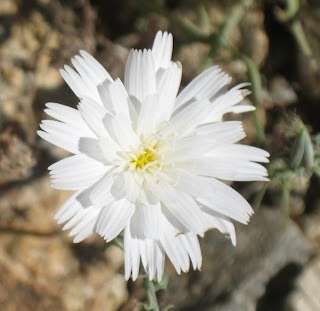
The brittlebush creates splashes of color on hillsides all over the desert. Descending via Montezuma Valley Road (highway S22), we saw brittlebush all along the road. These wildflowers were also numerous along the Palm Canyon Trail (especially the alternate trail) and Little Surprise Canyon Trail.

Besides heat, these caterpillars are a reason why wildflowers disappear.

If I were a botanist I could tell you the name of this unidentified field of white flowers glowing in the late afternoon light at Little Surprise Canyon.

Closeup of a brittlebush bloom.

Broom-rape, a parasitic wildflower.

Closeup of a desert chicory bloom with its etched petals.

Closeup of a desert poppy bloom.
 The brittlebush creates splashes of color on hillsides all over the desert. Descending via Montezuma Valley Road (highway S22), we saw brittlebush all along the road. These wildflowers were also numerous along the Palm Canyon Trail (especially the alternate trail) and Little Surprise Canyon Trail.
The brittlebush creates splashes of color on hillsides all over the desert. Descending via Montezuma Valley Road (highway S22), we saw brittlebush all along the road. These wildflowers were also numerous along the Palm Canyon Trail (especially the alternate trail) and Little Surprise Canyon Trail. Besides heat, these caterpillars are a reason why wildflowers disappear.
Besides heat, these caterpillars are a reason why wildflowers disappear. If I were a botanist I could tell you the name of this unidentified field of white flowers glowing in the late afternoon light at Little Surprise Canyon.
If I were a botanist I could tell you the name of this unidentified field of white flowers glowing in the late afternoon light at Little Surprise Canyon. Closeup of a brittlebush bloom.
Closeup of a brittlebush bloom. Broom-rape, a parasitic wildflower.
Broom-rape, a parasitic wildflower. Closeup of a desert chicory bloom with its etched petals.
Closeup of a desert chicory bloom with its etched petals. Closeup of a desert poppy bloom.
Closeup of a desert poppy bloom.

2 comments:
I can't believe I found this photograph of the caterpillar. I have been trying to identify it and find out what it will turn into. Do you hve any idea what it is?
Hi, Gail!
I enjoyed looking at your beautiful photographs from Anza-Borrego!
Comments on your pix from 3/29/08 and 7/25/07:
- your unidentified field of "white flowers" look like Amsinckia tessellata, fiddleneck, in seed; see
http://calphotos.berkeley.edu/cgi/img_query?query_src=photos_index&enlarge=0000+0000+1205+1068
- your "Broom-rape, a parasitic wildflower", is actually Hyptis emoryi , desert lavender:
http://calphotos.berkeley.edu/cgi/img_query?query_src=photos_index&enlarge=0000+0000+0506+3533
- your lovely picture of "silver cholla" is actually Gander's cholla, Opuntia ganderi:
http://tchester.org/plants/analysis/cholla/ganderi_et_al.html
- the caterpillar is a sphinx moth; search for that term on this page:
http://waynesword.palomar.edu/redmite2.htm
Tom Chester
tom@tchester.org
Post a Comment